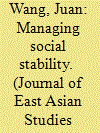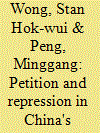| Srl | Item |
| 1 |
ID:
137205


|
|
|
|
|
| Summary/Abstract |
Based on a town government's meeting memos between March 2001 and October 2007, annual work reports, and my interviews with local officials, I show that China's township governments have strived to contain, rather than resolve, social discontent. The tendency toward containment lies in two fundamental features of China's political institutions and central government strategy. First, in order to optimize the function of the petition system as a source of information without losing control, the Hu Jintao administration (2002–2012) passed regulations protecting the rights of petitioners on the one hand, and simultaneously put pressure on local officials to discourage petitioning, on the other. Second, the technical, institutional, and political features of China's cadre evaluation system encouraged local officials to take a short-term perspective on challenges, avoiding penalties rather than actually solving problems.
|
|
|
|
|
|
|
|
|
|
|
|
|
|
|
|
| 2 |
ID:
137206


|
|
|
|
|
| Summary/Abstract |
China has established a petition system to elicit information about grievances. However, the petition system may have perverse effects because it also reveals to the center the failure of local-level officials to resolve those grievances. Anecdotal accounts suggest that local officials have incentive to silence petitioners, often with the use of repression. In this article we study whether non–regime threatening petitions would provoke local governments' coercive response. To tackle the endogenous relationship between petition and repression, we take advantage of a natural experiment afforded by a change in hydroelectricity policy in China. In particular, we use provincial hydropower outputs as an instrument to identify citizen petitions. We find that citizen petitions significantly increase a province's spending on its repressive apparatus. The results suggest a paradoxical outcome of China's petition system: while it may help reduce the national authority's use of repression, it has caused an explosion of repression within the authoritarian system as a whole.
|
|
|
|
|
|
|
|
|
|
|
|
|
|
|
|